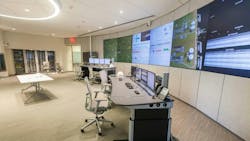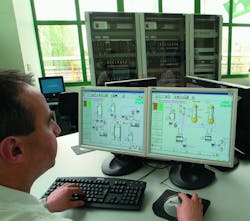Marjan project introduces smart technology for simultaneous yard pre-commissioning
Abdulelah Bajandouh * Saudi Aramco
Talal Alghamdi * Saudi Aramco
Ayidh Alfataih * Saudi Aramco
David Walker * Emerson
Selvakumar Ramamoorthy * McDermott
As an integral part of Marjan Increment Program (MIP), the Marjan Offshore GOSP-4 (gas/oil separator plant) project is being fabricated in several fabrication yards across the globe due to its massive size and quantity of facilities.
The offshore GOSP consists of six main platforms (jackets and topsides), along with associated bridges and flare systems. Three of these platforms are being fabricated in Indonesia, two in China, and one in Dubai, while the jackets were fabricated in Oman.
The six main platforms are:
- The Accommodation Platform (ACC), which hosts the living quarter for more than 200 employees in addition to the main Central Control Room (CCR)
- The Production Platform (PP), which mainly processes the received crude oil and segregates the gas
- The Gas Compression Platform (GCP), which processes the gas stream and sends it onshore
- The Electrical Distribution Platforms (EDP) for the power system handling and distribution
- The Auxiliary Platform (AUX), which provides the utility systems and safety/fire protection
- The Tie-in Platform (TP), which receives all incoming services and sends out all outgoing services.
With such scattered fabrications, many challenges arose particularly regarding control system integration. To avoid the conventional methods of offshore integration, which often occur too late to fix issues and involve too tight a schedule to implement all pre-testing requirements, the project team had to think outside the box to manage and monitor this project effectively. As a result, a sophisticated control system was created and implemented.
This system helps oversee all the different topsides of the project, ensuring everything communicates properly, and that signals are transmitted smoothly from the CCR in Indonesia to all other yards in China or Dubai. Traditionally, this has been a complex and challenging task, but new technology offers a simpler, more efficient way to handle it. Here, we will explore how this innovative approach is changing the game.
Process control system
Marjan Offshore GOSP-4 uses a process control system (PCS) to control and monitor its complex parts. The main control room in the accommodation platform has a centralized server. Other platforms (like AUX, PP, EDP, GCP, ACC & TP) have smaller controllers that are connected to the main control room through a process control network (PCN).
The PCN allows communication between these controllers, servers, and workstations. Before moving all installations offshore, these controllers need to be connected to the main server at the control room. Doing this at different geographical construction sites (Indonesia, China, and UAE) is challenging.
The traditional approach
Traditionally, to test everything before moving offshore, each part is tested separately at its location. Data from each location is collected and merged into one database. This process needs to be repeated to ensure that the data is correct.
Furthermore, in the old method different controllers are physically connected to the main control room only after moving offshore. The process is slow and risky.
Here are a few key challenges that can arise during execution when traditional method is used:
- Difficulty in keeping data and templates consistent globally
- Changes in global data need to be updated locally
- Difficulty in tracking and merging different databases
- Merging data takes a lot of time
- Additional hardware and software are needed for the temporary servers.
New, innovative solution
The new approach uses cloud-based testing solution using remote virtual office (RVO) technology to make the process simpler and faster.
With RVO technology, a central server is set up at a secure location. This server connects different construction yards to the main control room in Batam, Indonesia, through a reliable internet connection (4G/5G).
During pre-commissioning, any changes in the system will be updated at the central server and applied to all controllers at the same time. After completing the onshore testing, the data will be moved from the RVO server to the project’s main server.
Cloud-based testing solves the problems of the traditional method and has these benefits:
- Ensures the server data is secure and consistent
- Reduces the need for travel for setup and configuration
- Allows simultaneous updates everywhere
- Reduces the need for repeated offshore testing
- Eliminates the need for extra hardware and software.
By using this new method, MIP can manage the GOSP-4 facility more efficiently and effectively, saving time and reducing complications.
Cloud-based testing
The program’s shift to cloud-based testing approach for the GOSP-4 facility represents a significant advancement in project management and control for several reasons:
Enhanced efficiency. By using cloud-based technology, the program can manage and monitor all parts of the facility from a central location, reducing the need for time-consuming and complex manual process.
Improved data integrity. The centralized server ensures that all data are accurately maintained and updated in real-time, reducing the risk of errors and inconsistencies that can occur with traditional methods.
Reduced travel and costs. Technicians no longer need to travel frequently to different sites for testing and configuration, which not only saves time but also reduces travel-related expenses.
Immediate updates. Any changes or updates can be deployed to all parts of the facility at once, ensuring that all systems are consistently aligned and up-to-date.
Minimized need for additional hardware. The reliance on cloud technology reduces the need for extra hardware components, simplifying the setup and maintenance process.
Streamlined offshore operations. With less need for repeated testing and adjustments at the offshore site, operations can proceed more smoothly and with fewer interruptions.
Conclusion
By leveraging centralized servers and remote access technology, MIP can ensure smoother operations, maintain date integrity, and reduce the need for extensive physical travel and hardware. This innovative solution not only simplifies the complex processes involved in monitoring and managing large-scale facilities but also sets a new standard for efficiency and reliability in the industry. As technology continues to evolve, the benefits realized from this approach underscore the importance of embracing modern solutions to meet the challenges of today’s industrial projects.
Khalid Z. Al-Sulaim, director of Marjan Increment Projects, said: “GOSP-4 will be the biggest offshore facility ever built by Saudi Aramco with an objective to increase the production of Marjan field, which will support the Kingdom to meet the rising demand of energy. Therefore, the deployment of the most advanced technologies is definite to enhance the execution of this state-of-the-art complex project.”

